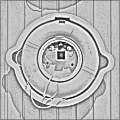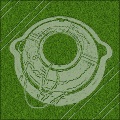|
Carlos Carreno
|
||||
| Posted: September 13, 2014 4:50 pm | ||||
|
Carlos Carreno
|
With this image

your snippet send this error: “A script error ocurred during the rendering†You can see the solution of the problem here Snippets with solution The solution is prevent the división by 0: o/l and o/m I solve the problem with this lines if l==0 then div1=o/0.000001 else div1=o/l end; if m==0 then div2=o/0.000001 else div2=o/m end; local v = get_sample_curve(x, y, H, HI) + (div1)*Lg + (div2)*Mg Bump_Height map to Ambient Occlusion map.ffxml |
|||
| Posted: September 13, 2014 5:36 pm | ||||
|
SpaceRay
|
Thanks for the fix and the filter solution
Gracias por la solución y el filtro
Sorry by my ignorance and not enough experience with this topic. What I still do not understand is what this description means, as I do not why is useful to convert an bump/height map into an ambient occlusion map What is this useful for? and why would want to do this conversion? or when would it be good? Would be good to have some example Thanks SerÃa de agradecer saber para que sirve realmente este filtro y porque es útil esta conversion y para qué se puede usar. Gracias |
|||
| Posted: September 15, 2014 1:05 am | ||||
|
Skybase
|
Several uses. 1. During rendering, you can save render time by baking ambient occlusion maps into an image hence removing the time to render ambient occlusion all together (in real time or not). There are a bunch of ways of doing this, typically your 3D program bakes maps if you got UVs generated for your 3D models. This method is nice because it lets you generate ambient occlusion via a height map. You can also think about it this way: maybe you just have a height map and you don't want to spend more time messing around with your 3D tools, you just want ambient occlusion off the bat. Well, there you have a method. 2. To add depth / shading to your textures. AO is essentially shading. These aren't like raytraced hard shadows so it's a nice way to add something extra to it. You can use AO to make awfully flat things to look pretty bumpy given it adds some contrast to places where there's occlusion. 3. If you get a bit smart, you can use occlusion layers for adding layers of dust, gunk, grime, junk, melting stuff, whatever to your texture... to give it some wear and tear. The idea's to use ambient occlusion for texturing purposes, hence you can use occlusion to determine where to add all that wear and tear. 4. Oh you know, so many other uses. |
|||
| Posted: September 15, 2014 1:32 am | ||||
|
SpaceRay
|
OH! I see that this can be used in 3D software in different ways, and I did not know because I still have little experience in the 3D world of 3D maps and texturing
Thanks very much for explaining it and giving some uses that this may have, this is why then , why this filter has a HU reward |
|||
| Posted: September 15, 2014 2:04 am | ||||
|
Carlos Carreno
|
||||
| Posted: September 15, 2014 6:37 pm | ||||
Join Our Community!
Filter Forge has a thriving, vibrant, knowledgeable user community. Feel free to join us and have fun!
33,773 Registered Users
+7 new in 30 days!
153,661 Posts
+5 new in 7 days!
15,367 Topics
+56 new in year!
Online Users Last minute:
20 unregistered users.
Recent Forum Posts:
- Adaptive Tiling by byRo by Ramlyn
February 5, 2026 - Multicolor Plasma Waves by mgreen by The_Funktasm
February 4, 2026 - Flipping Image Animation by Rachel Duim by Rachel Duim
January 25, 2026 - Suggest a new filter. by Rachel Duim
January 22, 2026 - How to install filter forge 13.0 into the newest version of Photoshop? by CFandM
January 20, 2026 - how to import filters from previous version by jess
January 19, 2026 - Chaos Fields by Rachel Duim
January 16, 2026 - Random Crashes using FF14 by PixelStar
December 29, 2025 - Is "snap to grid" actually working? by Raschid Abdul-Nour
December 26, 2025 - Minimalistic Patterns by Ramlyn by Ramlyn
December 25, 2025 - Circumball by Ramlyn by Ramlyn
December 25, 2025 - Affinity 3: Use size of single Artboard by Raschid Abdul-Nour
December 25, 2025

